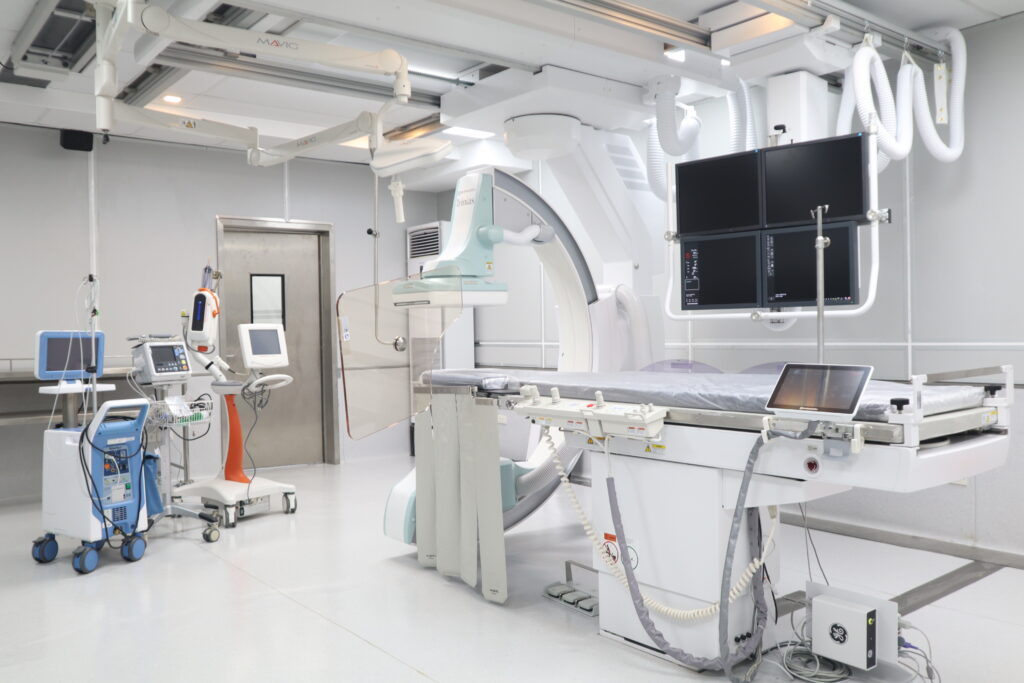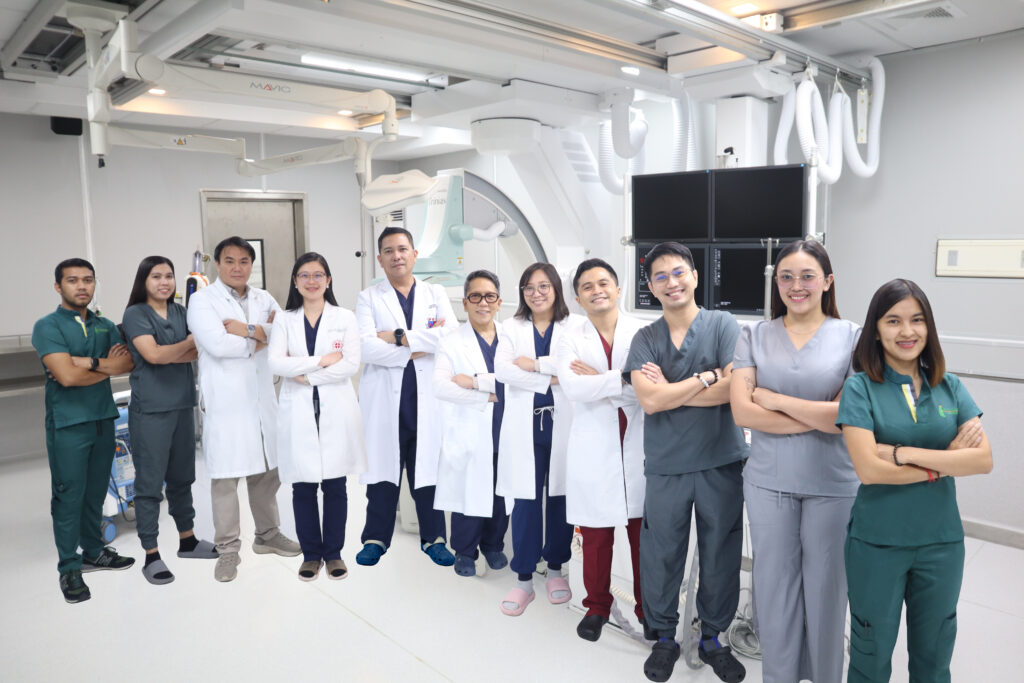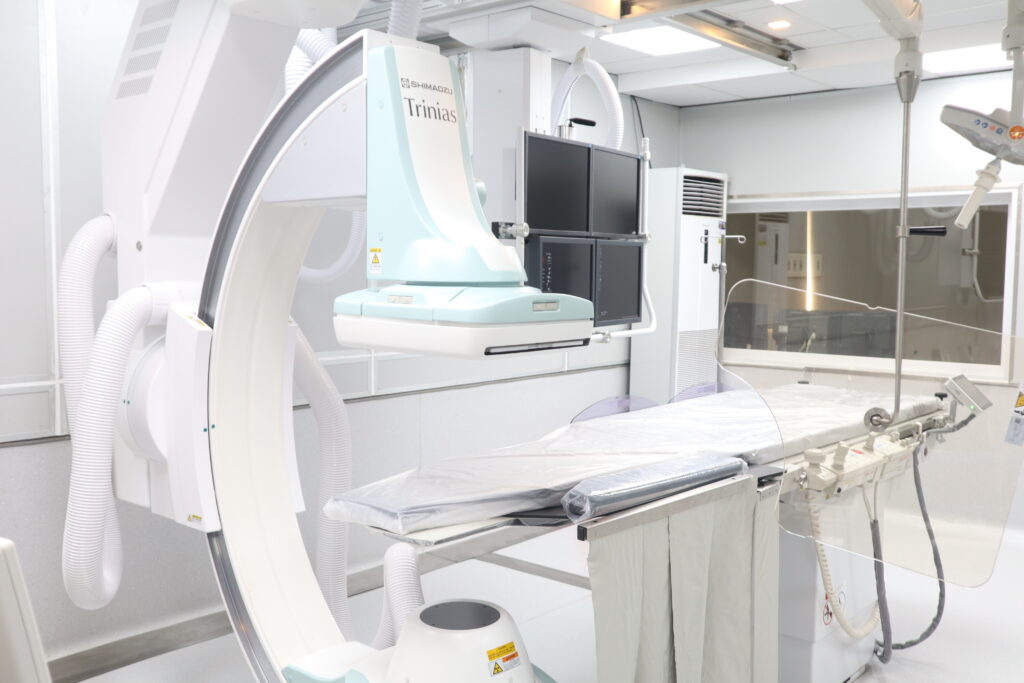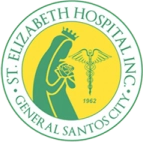
The Catheterization Laboratory (Cath Lab) facility at St. Elizabeth Hospital is poised to transform cardiac care that allows the performance of minimally invasive diagnostic tests and treatment procedures on patients with various heart conditions. Procedures range from diagnostic tests, such as coronary angiography, to complex interventions like angioplasty, stent placement, and electrophysiology studies. Equipped with advanced imaging technology, a Cath Lab enables cardiologists to visualize the heart and blood vessels in great detail, providing critical information for accurate diagnosis and effective treatment.
The Cath Lab is also suitable for other non-cardiac procedures that may be performed by Interventional Neurosurgeons, Peripheral Vascular Surgeons and Interventional Radiologists.
Patients in Region 12 will no longer need to travel outside the area to access advanced cardiac treatments. By providing these services locally, we aim to alleviate the financial strain associated with seeking care in distant cities while ensuring that patients can receive the support of their families throughout their treatment journey.

St. Elizabeth Hospital Inc.’s Cath Lab Team
Allow us to introduce the distinguished members of our CathLab team, who are dedicated to delivering exceptional care:
Dr. Rachel Denila, Interventional Cardiologist—Dr. Denila graduated from Davao Medical School Foundation, Inc., where she ranked 2nd as an academic scholar. She successfully finished her residency in internal medicine at Southern Philippines Medical Center. She pursued subspecialty training in adult cardiology at the Philippine Heart Center and was recognized as the most outstanding fellow in research in 2022.
Dr. Anna Lorraine Lucero, Interventional Cardiologist – Dr. Lucero achieved her medical degree from Our Lady of Fatima University and subsequently her fellowship training in adult cardiology and interventional cardiology at the Philippine Heart Center and Manila Doctors Hospital, respectively. She specializes in cardiovascular diseases and interventional cardiology procedures such as Coronary Angiogram, Graft Angiogram, Coronary Angioplasty, and other related procedures.
Dr. Alain Tracy Mosqueda, Interventional Radiologist – Dr. Mosqueda completed his medical education at Ateneo de Cagayan-Xavier University College of Medicine and received fellowship training in vascular and interventional radiology at the National University Hospital. He is a fellow of the Philippine College of Radiology and an affiliate of the Southern Mindanao Chapter.
Dr. Johnson Wee, Adult Cardiologist (Electrophysiologic Studies) – Dr. Wee is an esteemed adult cardiologist with over three decades of experience in heart health and patient care. A graduate of Southwest University in 1990, Dr. Wee refined his medical expertise through an internship at Southern Island Medical Center in 1991, followed by a residency and fellowship at Chong Hua Hospital in 1997 and 1998, respectively. Renowned for his compassionate approach and innovative treatments, Dr. Wee’s profound knowledge and dedication to cardiology have made him a trusted and respected figure in the medical community, profoundly impacting the lives of his patients.
List of Procedures Done in Catheterization Laboratory
Coronary Angiography: An imaging technique to visualize the heart’s blood vessels to detect blockages or other abnormalities.
Percutaneous Coronary Intervention (PCI): Includes procedures such as angioplasty (balloon dilation) and stent placement to open narrowed or blocked coronary arteries.
Electrophysiology Studies: Tests conducted to evaluate the heart’s electrical system and diagnose arrhythmias.
Cardiac Catheterization: This is done by inserting a catheter into the heart, which enables the diagnosis and treatment of cardiovascular conditions.
Valvuloplasty: Procedure to repair a narrowed heart valve by inserting and inflating a balloon.
Implantation of Pacemakers and Defibrillators: Placing devices to help manage abnormal heart rhythms.
Atherectomy: This procedure removes plaque from blood vessels to improve blood flow.
Endomyocardial Biopsy: Taking small samples of heart tissue for diagnostic purposes.
Peripheral Angiography and Intervention: This procedure involves Imaging and treating blood vessels outside the heart, such as those in the legs or arms.
Right Heart Catheterization: Measures pressures in the heart and lungs to diagnose conditions like pulmonary hypertension.

FAQs about the Cath Lab
What is a Cath Lab used for?
Cath lab is crucial in diagnosing and managing various cardiovascular conditions while minimally invasive. It often leads to faster recovery times and reduced risks compared to traditional surgical approaches.
Why are patients sent to the Cath Lab?
Patients are referred to the Cath Lab for several reasons, primarily related to diagnosing and treating cardiovascular conditions.
What is the Cath Lab used for?
A Cath, or catheter, is a thin, flexible tube inserted into the body to perform various medical tasks. Different types of catheters, such as cardiac, urinary, and gastrointestinal catheters, are designed for specific purposes.
Is Cath Lab painful?
The Cath Lab itself is not inherently painful. It is a specialized medical facility that performs minimally invasive procedures under controlled conditions. However, depending on their nature, the procedures in the Cath Lab can cause discomfort or pain for the patient.
What labs are needed before cardiac catheterization?
Several laboratory tests are typically required before cardiac catheterization, including a complete blood count (CBC), urinalysis, chest X-ray, and an electrocardiogram (EKG). These tests are essential to ensure the procedure can be conducted under optimal and safe conditions.
Discover Advanced Cardiac Care at St. Elizabeth Hospital Inc.!
The opening of our CathLab facility represents a significant step forward in advancing cardiovascular medicine in our region. We are excited to embark on this journey with our healthcare partners, and we look forward to serving our community and collaborating with you to enhance patient care and outcomes.
Contact us at 0919-071-9012 today to schedule a consultation or learn more about our Catheterization Laboratory services.

